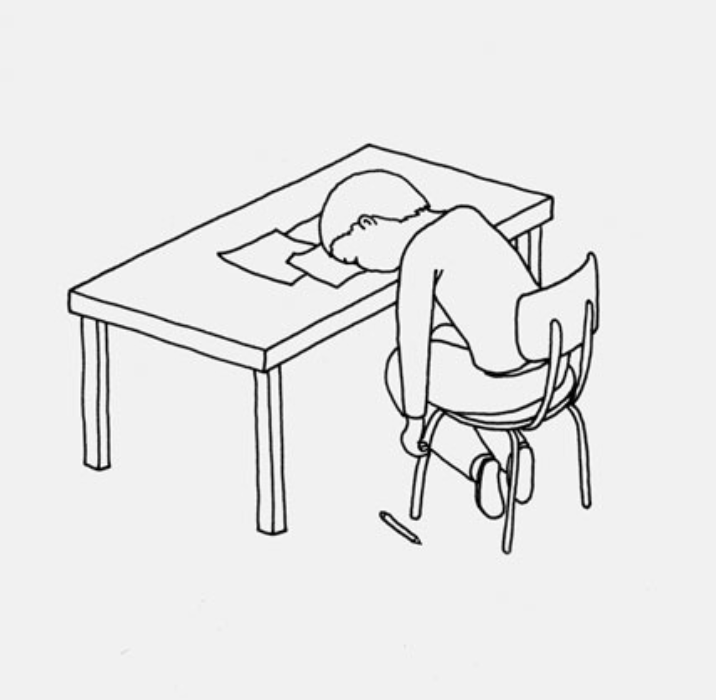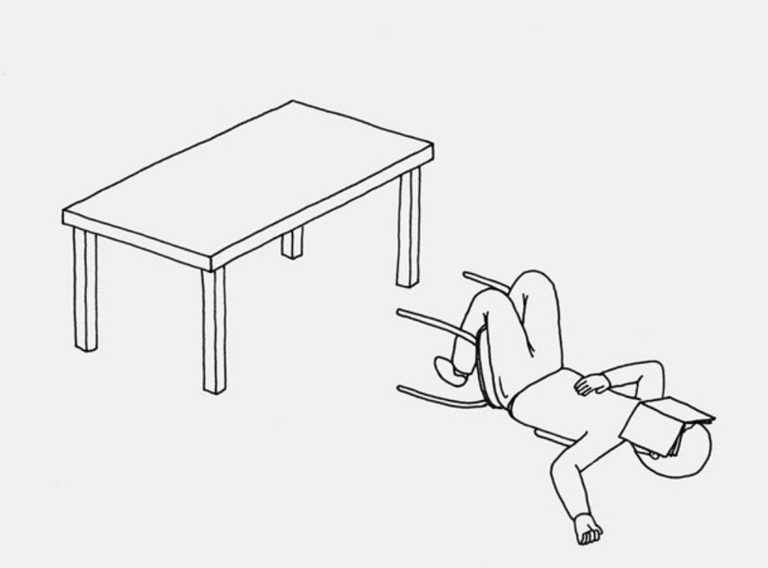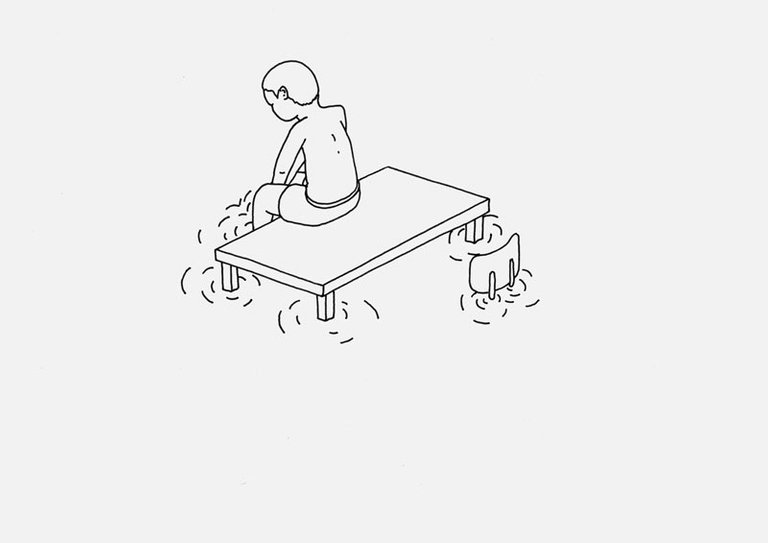Time is precious
Tell me if this scenario sounds familiar:
It's the night before your exam. You've been studying (cramming) for the entire day, and everything still seems like friggen gibberish to you. Maybe you feel like crying, or maybe you've already had your 30 minute cry break (it's ok, I won't tell), but from all this studying, you know at least one thing: you're screwed, dude (or, as they say: "F'd in the B").
I hate when this happens, and it used to happen to me a lot. However, over the past few years I literally didn't have the time to handle a situation like that anymore (vicious work/class/sleep/baby cycle), so I had to start thinking of ways to save my ass from the depression/insanity spiral that comes from not knowing shit as a student.
And now, I'd like to impart my wisdom onto you, in hopes that it will save you some time so that you can study better and not be a hermit.
A little background on me (you can skip past this section)
You see, I'm a full time wage slave, father, and "non-traditional" (see: old) student. I decided to go back to college for a new degree, since my current field pays a garbage salary and has little to no upward mobility.
I stare at screens for a majority of my work day. After that portion of the day is over (also known as my personal hell), I face 1 of 3 scenarios:
- I drag my corpse of a body to class and try to pay attention (while staring at even more screens, since the degree will be in computer science)
- I come home and try to keep my kids from destroying the apartment
- I come home and try to find time to study, so I don't fail my classes
Regardless of the option picked above, most of my free time is dedicated to caring for the ol' offspring. Babies take a lot of time to look after, even with 2 parents, and I have a little one that it super attached to me right now.
In other words, I don't have a lot of time. Being a dad is hard. Going to college is hard. Working a job that doesn't pay well is also not good for the psyche. If I succeed with this degree, though, I'll have a chance at paying off my family debt at least 2x faster, and that's why it's all worth it to me.
This has caused me to be very protective of my free time, especially when it comes to classes. If I'm trying to pull an all-nighter and the baby wakes up, I might need to help get that little sucker back to sleep.
What I did
Studying for me, especially when it comes to math (combinatorics, discrete, and various levels of calc, in my case), takes quite some time. Time I didn't have.
Here are the 4 things I did to save myself time, which helped me pass my classes and not become as much of a sleep deprived maniac.
Changed my note taking method

Some classes don't let you take notes on your computer, and even if they did, disorganized notes (or notes with too much superfluous information) are not going to be helpful for an exam.
I break each page of my notebooks down into 2 - 3 sections:
- Where the notes go
- Where the topics go (this must be visibly spaced away from the notes. I always use the margin for this)
- Where the summary goes
Section 3 can be reserved for the last page of each class, but I find that breaking each page into a summary section helps for micro-studying (next section). Either way, the summary/summaries should be short and to the point. Don't mince words.
Practiced micro-studying
With micro-cleaning, you do little things around your apartment as you move around throughout the day, so that messes don't pile up. When it's time to do a "big clean," it only takes a few minutes as opposed to several hours.
Micro-studying is a lot like micro-cleaning.
With this method, you study for about 5-10 minutes a day. When I say study, I mean you basically read over your notes once or twice. You can do this after your class dismisses, or when you're on the treadmill ("new year new me"). Reading over your notes helps you understand where your "weak points" are. These could be areas that you didn't pay attention to in class, or where your professor did a bad job of explaining what's going on. If you summarize your notes (like the above section suggests), you'll really have your class lessons hammered into your head.
The best part about this practice? When it comes to studying before the big exam, you'll find that you've pretty much memorized everything already. No more crying in the shower at 7 AM so that your roommates don't hear after pulling an all nighter. Score!
Got a Tutor
Back in medieval Europe (straight-up feudalism, yo), nobles were in charge of the masses. Some movies and books portray nobles as a bunch of hoity toity, dainty bastards who didn't know how to handle a sword in combat like a "real warrior," but this was far from the case for many young males in that class.
You see, nobles had money. Those on top could use their funds to ensure that they were smarter than the common folk, not just in terms of handling the business of getting rich off of their fiefdoms, but in terms of armed combat.
They would pay people to teach them the art of combat, and not just to the level of "poke them with the pointy end of this sharp stick." They would also be able to pay for all of the fancy armor, and surround themselves with others that were also wearing fancy armor. Where a commoner (some farmer's son, probably), was sent to war in a potato sack and a makeshift spear, a noble that had to fight would probably go with more efficient weaponry, armor, and a practiced understanding of several combat strategies that the peasants didn't have access to.
Interesting, right?
Why am I talking about this? Because nobles essentially used tutors, and so can you. A good tutor will be able to save you hours of studying in a 60 minute session. Tutors are the reason I passed some of my heavier courses - I just didn't have the time to study without one. Why slam your head against a wall, trying to figure out how to handle homework problems that your math textbook doesn't explain, when a tutor can help guide you through the difficult parts in minutes, and in a way that helps you understand?
If you have the money, and you want to save the time, get a tutor. I'll explain how to use them effectively in a separate article.
Don't have time for a tutor? Splurge on time saving resources.
Used existing resources
Maybe you're not a social butterfly, or maybe a tutor is a bit much for you to take in at this stage of life. That's fine. Sometimes there are resources out there that beat studying with your textbook and class notes alone.
Sometimes these resources cost a bit of money, but regardless, finding them can help you get a grasp on the subject matter much faster than studying alone.
Take anatomy, for example. Anatomy is typically a difficult subject to grasp. Memorizing all of the body parts so that you know their names and what systems they're a part of is hard (and therefore time consuming). If you're familiar with mnemonic study methods, though, then this resource will blow you away. Although it costs about $57 USD at its base level, perhaps it's worth more to you to be able to memorize the names and locations of anatomy quickly, so that you don't blank out on an exam.
Or maybe you have a course about learning MS Access databases? You could spend hours frantically searching YouTube clips only to find advertisements for shady websites, or use a paid service like Lynda to specifically review Access databases and maybe pick up a little VBA on the side.
There are also free, curated resources for some subjects online, such as Khan Academy, which can be a step up from searching through YouTube leftovers for lackluster tutorials.
And of course, if you know anyone that's been in your place before, they may have old study guides and notes that could help. There are several websites dedicated to gathering previously taken class notes, which could be useful. These sites also offer note-takers a little cash if their notes are uploaded to the site and get good traction. It's important that you look at these resources before you get in too deep with your course.
Conclusion
If you're a fan of studying by slamming your head against a desk for consecutive hours, only to forget the measly amount of information you retained just after you finish your exams, then be my guest and keep it up.
However, if you don't want to have studying habits equivalent of slamming your balls in a desk drawer to help commit something to memory, it might be the time to follow one of the above suggestions to improve your time in the schooling system.
Either way, I hope the above information helps.
If you have any additional study tips, put them in the comments below! Disagree with anything I said? Let me know - I'd love to hear your point of view.
Image sources: all images are linked to their appropriate source with the exception of the notebook, which was made by yours truly.





As usual, I am doing things arse-backwards. I first read your later post and then came back here.
It really is heartbreaking to see such good posts barely smeared by one or two snail trails.
I'll tell you straight out, I do not like Resteeming. When (or if) anyone checks my blog, I want them to concentrate on my posts...so what I do is Bookmark the posts I want to find easily.
In this case, your info is so useful for students, that I'm just going to have to grin and bear it - both posts being resteemed (I damn well hope it earns you at least a few upvotes, though students don't often have much clout for upvoting).
Thanks for the compliment, it's much appreciated!
Even if the post doesn't do well now, in terms of upvotes, at least it's on the blockchain for future readers to pick up (if it's worth its salt). I'm trying to get back in the swing of things with writing, so this is a beneficial exercise for me, either way.
That being said, I wish people knew more about proper study habits. I know a lot of students who are constantly stressed because they haven't budgeted their time well, or didn't put enough forethought into being efficient. That's the real shame! Too much stress.